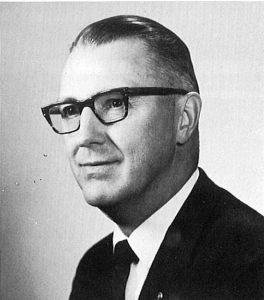Vernon Grinde: Class of 1938
By Per Peterson

Forty-three years as a teacher. Thirty-two years as a principal.
There’s no question that education defined Vernon Grinde, one of this year’s Tracy Area High School Wall of Fame inductees.
“People, especially kids and their potential, was his main interest,” said Grinde’s son, Todd, who will accept the honor on his late father’s behalf at the Nov. 14 American Education Banquet at The Caboose. “He was constantly trying to innovate better methods of teaching and was highly involved in bringing the Special Ed classes into schools in Minnesota.”
The youngest of seven children born to Ole J. and Ida (Furan) Grinde, Grinde was born Feb. 29, 1920, and grew up on a farm in Lake Sarah Township, south of Garvin. He attended District 9 country school through eighth grade. He graduated from Tracy High School in 1938.
Grinde, who died on Jan. 5, 2015, began his teaching career at a rural school north of Slayton in 1940. A three-year stint in the U.S. military during WWII interrupted his teaching. He served for three years, mostly in England and France. Grinde served 37 months in the U.S. Army Medical Corps. He returned after the war to lead the country school south of Tracy.
After earning his four-year college degree at Mankato State, Grinde taught elementary students at Amiret for two years and at Garvin for a year. In the fall of 1949, Grinde accepted a sixth-grade assignment at Tracy Elementary School, which then stood at the corner of Fifth and Rowland streets. During his early years of teaching he continued college through summer classes to obtain his Master’s Degree in Education.
In the early 1960s, he helped pioneer public education for the learning disabled, and taught summer sessions at Westmar College to help establish a curriculum for new teachers in that field.
In the fall of 1951, he succeeded Ann Welch as the school’s principal. Grinde served as Tracy Elementary’s principal for 32 years, retiring in the spring of 1983. During his time as principal, Grinde was active in M.E.A., N.E.A., MN Principals Association, National Association of Elementary Principals and various committees for the State Board of Education.
Grinde was very active in community service and civic organizations: Chamber of Commerce, Kiwanis, Labor Day Parade, Prime Timers, Meals on Wheels, Laura Ingalls Pageant and many advisory boards and committees. He was named Outstanding Citizen of Tracy and served as Lt. Gov. for Kiwanis. He was a long-time active member of Tracy Lutheran Church, serving several terms as congregational president, many years as Sunday School superintendent and on many committees.
Some of Grinde’s greatest challenges occurred in the aftermath of the June 13, 1968, tornado that destroyed the old Tracy Elementary School building on Rowland Street. Grinde, who often said how thankful he was that no one was in the building when the twister struck, helped plan the new elementary school on Pine Street that opened in 1971. Classes were held in church basements and temporary huts erected on school grounds until the new school was completed. Tracy Elementary School’s playground is named in Grinde’s honor.
He and his first wife, the late Ruth Grinde, had three children: Katherine, Todd, and Lee. Vernon and Ruth shared almost 32 years of marriage before Ruth’s death in 1978. Grinde married Doris Maas in 1980.
Todd said that his father recognized early on that he was not cut out for farming, and as long as he can remember, was bound to be an educator.
“I think my father is very deserving of this honor,” Todd said. “As a Class of 1938 THS graduate, he went on to college in Mankato knowing he wanted to someday be a teacher in Tracy.
Grinde started teaching in a couple one-room country schools, was interrupted by WWII and spent a couple years in France with the Army, and then finished his four-year degree and was hired as a teacher in Amiret. From there, he transferred into the elementary school in Tracy teaching sixth grade and then became principal.
Todd said his father was sought by other schools, but he likely never strongly considered leaving Tracy. And the time he spent at the elementary school in Tracy left a lasting impact, as did all of the children who came and went.
“I once asked him how many kids went through Tracy elementary while he was there; he said he had no idea,” Todd said. “But when I asked him how many he remembered, his reply was ‘All of them.’ It seemed to me he remembered all their names and could recognize them as adults. Frequently at restaurants in other towns or cities, we would run into one of his former students who would ask him if he remembered them. Not only would he call them by name but probably name all their brothers and sisters. For myself and my siblings, the novelty of those occurrences maybe wore off after a while but it was still impressive.”
Biographical information for this story was provided by the family and Tracy Area High School.
